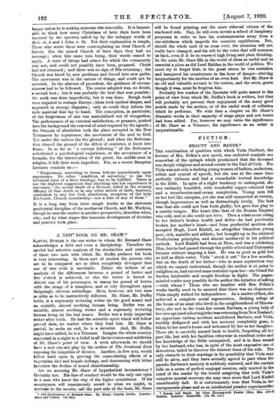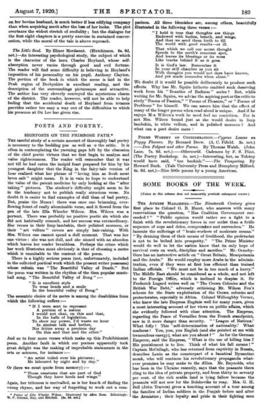FICTION.
BEAUTY AND BANDS.*
THE combination of qualities with which Viola Chalfont, the heroine of Mrs. Felkin's new novel, was endowed reminds one somewhat of the epitaph which proclaimed that the deceased was deeply religious and second cousin to the Earl of Cork. For Viola was not only a dashing young woman of fashion, audacious, selfish and cynical of speech, but she was at tho same time perfectly virtuous and had a remarkable textual knowledge 01 the Bible. In spite of a slight tendency to embonpoint, she was radiantly beautiful, with wonderful copper-coloured hair and a strawberries-and-cream complexion. Young men fell at her feet like ninepins, yet she was still unmarried at twenty, though impecunious as well as distractingly lovely. The fact was that she could not bear fools gladly, but gave free play to a caustic tongue. Her heart (like that of the Roman Empire) was cold, and so she could not wive. Then a crisis arose owing to her father's broken health and debts—he had previously broken her mother's heart—and from prudential motives she accepted Hugh, Lord Kinfell, an altogether blameless young peer, rich, amiable and athletic, but brought up in the strictest Presbyterian principles, and almost mediaeval in his political outlook. Lord Kinfell had been at Eton, and was a cricketing Blue, but he had passed through the public school and University furnace without singeing a hair. He was as good as gold but as dull as ditch-water. Viola "stuck it out" for a few months, but on the death of her father—who in some mysterious way which we cannot understand, though the author is at pains to enlighten us, had exerted some restraint upon her—she found the burden intolerable and sought freedom in flight. The pagan- minded reader may possibly do the author the injustice of asking —with whom ? Those who are familiar with Mrs. Felkin's works hardly need to be assured that there was no elopement. Viola simply wished for independence. As a matter of fact, she achieved a complete moral regeneration. Seeking refuge at the house of an aunt who lived in the neighbourhood of Shrews- bury, she met in the train her cousin Barbara, a young lady of her own age (and colouring)who was returning from New Zealand; an opportune railway accident annihilated Barbara, and Viola, terribly disfigured and with her memory completely gone, is taken to her aunt's house and welcomed by her as her daughter. There she is carefully nursed back to health, forgetting all her past life, but with her faculties otherwise in excellent order and her knowledge of the Bible unimpaired, and is in time wooed by her husband, who has, in spite of the most expensive use of detectives, failed to discover the faintest trace of his wife. The only obstacle to their marriage is the possibility that Viola may still be alive, and they have actually agreed to part when the pseudo-Barbara's memory is suddenly restored, and the curtain falls on a scene of perfect conjugal reunion, only marred in the mind of the reader by the horrid misgiving that with Viola's complete mental recovery she may once More find Lord Kinfell unendurably dull. It is unfortunately true that Viola, in her unregenerate phase and as an intellectual picador experimenting • Beauty and Bands. By Ellen Thomeyeroft Fowler (Hon. Mrs. aural Felkln). London : Constable. Us. 8d. net.1
on her bovine husband, is much better if less edifying company than when acquiring merit after the loss of her looks. The plot overtaxes the widest stretch of credulity ; but the dialogue for the first eight chapters is a pretty exercise in sustained conver- sation, while the moral of the tale is above reproach.



































 Previous page
Previous page